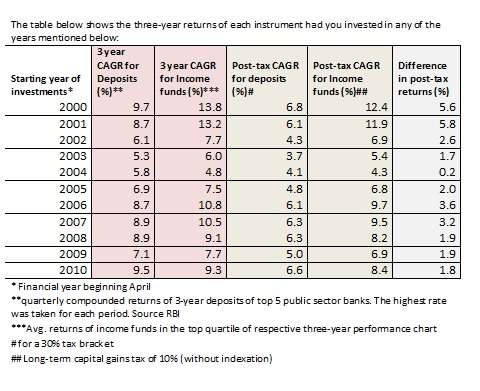For most investors, mutual funds mean investing in equities and therefore come tagged with risks.
Given this, for a risk-averse investor, there may be little choice left than to invest in plain vanilla bank fixed deposits. But did you know that a three-year deposit that you invested in 2010, for example, would not beat inflation (post tax), when you receive the maturity amount out in 2013? (Please see table below for returns).
What if you had a similar debt product that can deliver returns superior to fixed deposit returns and beat inflation? Would you not consider that?
If you are investing for not less than two years, then 'income funds' a class of debt mutual funds can deliver superior returns compared with bank deposits. That means you can earn a bit more than traditional debt avenues, by still staying invested in debt.
What are income funds and what makes them attractive?
Income funds
Income funds are a class of debt mutual funds that invest in a combination of government securities, certificates of deposits, corporate bonds and money market instruments. They are managed by expert fund managers who actively try to manage the portfolio based on interest rate movements, while at the same time keeping the portfolio credit worthy.
In other words, they seek to generate returns both in declining and rising interest rate scenarios by managing their portfolio actively. They either generate interest income by holding the instruments till maturity or manage gains by selling them in the debt market if the price of the instrument rallies well.
That means that these instruments will not guarantee you fixed returns like deposits. Yet, over the last 10 years, they have beaten three-year deposit rates, irrespective of the year in which you invested. Let us look at income funds' features and how they score over fixed deposits.

Income fund advantages
• Highly liquid. Can with draw money anytime unlike fixed deposits that come with a fixed lock-in period
• Actively managed. Seek to generate returns from varying interest rate cycles. Fixed deposits, on the other hand, carry re-investment risk. When a deposit matures and is reinvested, you may fall into a low interest rate regime and get lower returns than before.
• Have historically generated superior returns than fixed deposits. Please see data given.
• Very tax efficient, especially for those in the 20% and 30% tax brackets. Long-term capital gains (for holding over one year) are taxed at 10% without indexation or 20% with indexation. Interest on fixed deposits, though, is taxed at your income slab. Please see table for post-tax returns
• Offers high flexibility. Besides investing systematically you can even withdraw money systematically thus generating regular cash flow for yourself.
How to use income funds
• Invest your money in a combination of traditional fixed income options such as deposits and income funds to pep overall returns. You need not put your money in one basket.
• When you build a mutual fund portfolio, consider investing over one half of your capital in income funds when you have a time frame of say 2-3 years
• Use income funds, along with equity funds, as part of a long-term asset allocation strategy to build wealth. Choose the growth option.
• You can use income funds to also provide for some monthly cash flows by opting for a systematic withdrawal plan after first holding it for at least two years.
Note: If you have a time frame of less than 18 months, there are other short-term debt schemes that mutual funds offer. Income funds will not fit a short time frame. Also, remember that income funds do not guarantee fixed returns nor are they covered by insurance as is the case with bank fixed deposits (up to Rs 1 lakh). To this extent, they do not top the safety chart.
However, for longer periods, the interest rate risks are taken care of, thus generating superior returns for the limited risks assumed.
Birla Sun Life Dynamic Bond fund, IDFC SSI Medium Term Plan A, Templeton India Income Opportunities and HDFC Medium Term Opportunities are some of the consistent performers in this category.
Best Tax Saver Mutual Funds or ELSS Mutual Funds for 2015
1.ICICI Prudential Tax Plan
2.Reliance Tax Saver (ELSS) Fund
3.HDFC TaxSaver
4.DSP BlackRock Tax Saver Fund
5.Religare Tax Plan
6.Franklin India TaxShield
7.Canara Robeco Equity Tax Saver
8.IDFC Tax Advantage (ELSS) Fund
9.Axis Tax Saver Fund
10.BNP Paribas Long Term Equity Fund
You can invest Rs 1,50,000 and Save Tax under Section 80C by investing in Mutual Funds
Invest in Tax Saver Mutual Funds Online -
For further information contact Prajna Capital on 94 8300 8300 by leaving a missed call
---------------------------------------------
Leave your comment with mail ID and we will answer them
OR
You can write to us at
PrajnaCapital [at] Gmail [dot] Com
OR
Leave a missed Call on 94 8300 8300
---------------------------------------------
Invest Mutual Funds Online
Download Mutual Fund Application Forms from all AMCs